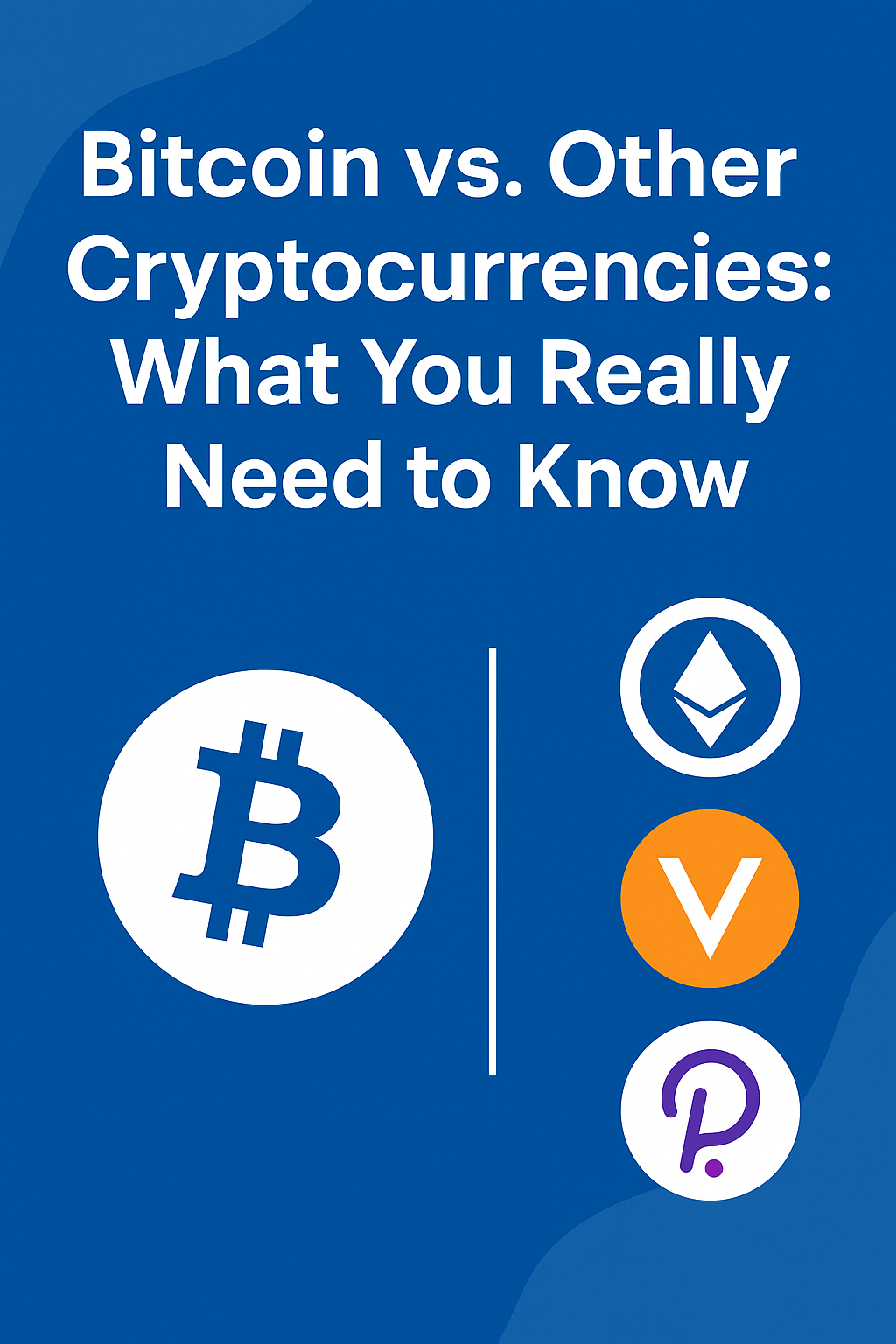Bitcoin vs. Other Cryptocurrencies: What You Really Need to Know
Since Bitcoin was launched in 2009, the world of cryptocurrencies has grown at lightning speed. Today, there are thousands of digital coins available on the market — but they are not all created equal. In this article, you’ll learn the key differences between Bitcoin and other cryptocurrencies, and why it matters if you’re planning to invest or simply want to understand the crypto space better.
What Is Bitcoin, Really?
Bitcoin (BTC) is the first and most well-known cryptocurrency. Created by the mysterious figure Satoshi Nakamoto, Bitcoin was designed to be a decentralized digital currency, allowing peer-to-peer transactions without intermediaries like banks or governments.
Its code is open-source, its transactions are secured on a blockchain, and its supply is limited to 21 million coins — making it a scarce digital asset often referred to as “digital gold.”
What Are Altcoins?
Altcoins (short for “alternative coins”) are all cryptocurrencies launched after Bitcoin. Many altcoins were created to improve upon Bitcoin’s limitations or to serve different purposes, such as enabling smart contracts, boosting transaction speed, or enhancing privacy.
Some of the most well-known altcoins include Ethereum (ETH), Solana (SOL), Litecoin (LTC), and Cardano (ADA).
Bitcoin vs. Altcoins: Key Differences
1. Purpose and Use Case
- Bitcoin: Created as a decentralized store of value and a peer-to-peer payment system.
- Altcoins: Many offer specific utilities, such as smart contracts (Ethereum), private transactions (Monero), fast payments (Litecoin), or NFT platforms.
2. Technology and Innovation
- Bitcoin: Focuses on security and decentralization, but has limitations in transaction speed and scalability.
- Altcoins: Tend to experiment with new technologies, offering faster, cheaper or more scalable solutions (e.g., Solana or Polygon).
3. Adoption and Market Trust
- Bitcoin: Widely accepted by individuals, companies, and even governments. It has the highest market cap and strongest brand.
- Altcoins: Vary in popularity. Some gain institutional interest, while others remain niche or speculative.
4. Supply and Inflation
- Bitcoin: Has a fixed supply of 21 million coins, creating scarcity.
- Altcoins: Many have no fixed supply or different inflationary mechanisms, which can affect their long-term value.
5. Security and Stability
- Bitcoin: Runs on the most secure and proven blockchain network.
- Altcoins: Vary in security. Some newer projects may be more prone to bugs or exploits.
Bitcoin vs Ethereum: The Classic Comparison
Bitcoin is designed to be a currency and store of value, while Ethereum is more like a platform that enables developers to build decentralized applications (dApps) using smart contracts.
They are often compared, but they serve very different purposes. Smart investors often hold both to balance security and innovation in their portfolios.
So, Which Should You Choose? Bitcoin or Altcoins?
If you’re looking for a safe, long-term digital asset, Bitcoin remains the most trusted option.
If you’re interested in diversification, innovation, or specific use cases like DeFi or NFTs, then carefully selected altcoins can offer high growth potential (along with higher risk).
🔑 Final Tip:
Always do your research. Understand what problem a crypto project solves, who’s behind it, how it works, and what risks are involved before investing.
Conclusion: Bitcoin Isn’t Everything — But It’s the Foundation
Bitcoin started the revolution, and it continues to be the benchmark for the entire crypto market. However, the future of cryptocurrency also depends on the innovation brought by altcoins.
Whether you’re just getting started or building a diversified portfolio, understanding the core differences between Bitcoin and other cryptocurrencies is your first step toward smarter crypto investing.
Liked this article?
Share it with a friend who still thinks all cryptocurrencies are the same. 🚀





Leave a Reply